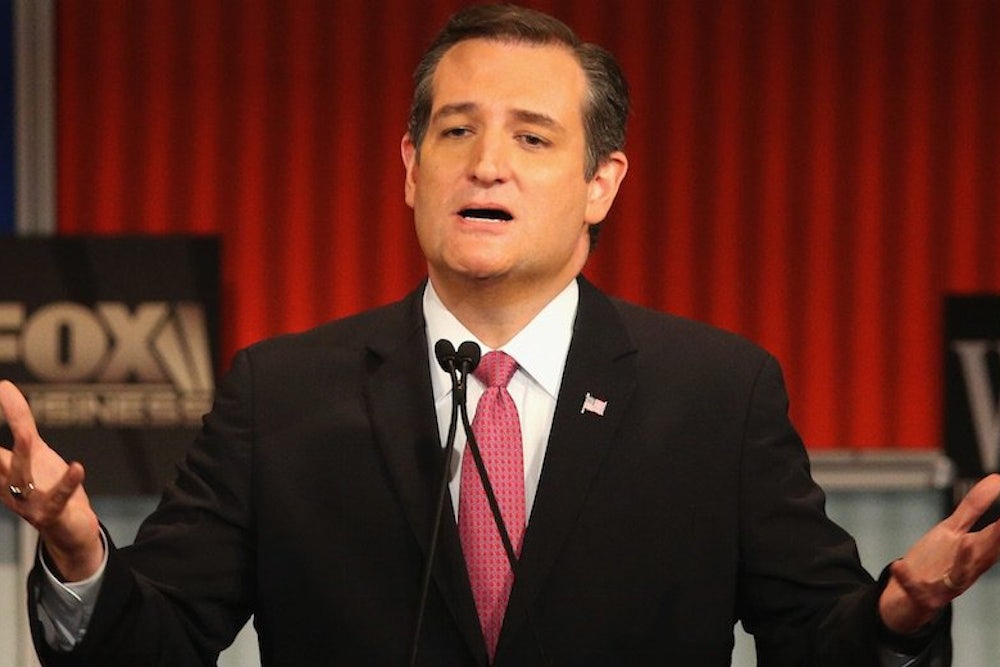Ted Cruz, the Texas senator currently in fourth in recent polls of the Republican field, gave a shrewd performance at the debate in Milwaukee on Tuesday night. He largely avoided the spotlight, instead allowing Ben Carson, John Kasich, Donald Trump, and Marco Rubio to squabble among themselves. His talking points, however, when he offered them, were carefully crafted to appeal to Evangelicals, Tea Partiers, and voters who want an outsider in the White House. In other words: much of the Republican base. As MSNBC wrote last month, “The Texas senator could very well be the sleeper, the ambush predator, and the fabled tortoise of this election.”
As the New Republic's Elspeth Reeve pointed out last month, Cruz believes that the Republican Party breaks down into four main brackets: the establishment, the Evangelicals, the Tea Partiers, and the outsiders. When the current frontrunners fade, Cruz thinks he can unite those last three groups, counting on his Christian roots (his father is a pastor) to secure the Evangelical vote, his ties to the Tea Party to become its standard bearer in the presidential race, and his record criticizing Washington to appeal to the voters who want an outsider candidate. Indeed, on Tuesday night, his talking points were carefully crafted to appeal to those three brackets.
In response to a question about immigration, Cruz said: “If Republicans join Democrats as the party of amnesty, we will lose. The politics of it would be very, very different if a bunch of lawyers or bankers were crossing the Rio Grande, or if a bunch of people with journalism degrees were coming over and driving down the wages in the press,” he continued. “Then we would see stories about the economic calamity that is befalling our nation." Those talking points are likely to resonate with the disaffected white voters currently rallying around Trump, who want an outsider in the White House.
Cruz also leveled harsh critiques at the “cronyism” in Washington. “Washington is fundamentally corrupt,” he said. “There are more words in the IRS tax code than there are in the Bible.” He has built his career on criticizing Beltway insiders, even from within Washington itself. As senator, he has attempted to shut down the government over both the budget deficit and Planned Parenthood funding. That record will help secure the allegiance of the voters who want an outsider in the White House—if and when Carson and Trump drop out. Furthermore, his Biblical reference may play well with Evangelical voters, who may begin to sour on Carson, particularly after the revelations about his life story this week.
He also aired an outlandish idea straight from the Tea Party playbook. Asked whether he would bail out the big banks, Cruz said he wouldn't—and argued that the Federal Reserve should return to the gold standard, which he called “sound money, which helps in particular working men and women." The New Republic’s Jeet Heer called that statement “goldbuggery," writing in our live blog, “Among the many examples of economic illiteracy during this debate, this really stands out." But regardless of its economic merit, goldbuggery may help Cruz win the hearts of Tea Partiers, who in 2011 led a push to get the gold standard reinstituted.
As Reeve wrote after the last Republican debate, this is “all part of his sinister plot: The Texas senator wants to steal the votes of his fellow Republicans.”
Cruz has been quietly laying the groundwork for months, the opposite of Jeb Bush's effort to “shock and awe” the competition when he launched his campaign. He now has an intricate constellation of pastor-supporters scattered throughout Iowa, each pledging to drum up support among their parishioners. He has also amassed a substantial war chest. During the third quarter in 2015, Cruz raised more than $12 million, twice the amount raised by Rubio in the same period. The money comes from Texas moguls like Darwin Deason, who comprise his natural base, but also from a sprawling network of small donors throughout Middle America.
Cruz isn't the only candidate to wait for opposition to lose momentum; Rubio held back in the first Republican debates until his main competitor, Jeb Bush, began to fade. When the day comes for Cruz to step into the spotlight, we'll know whether the legwork he's done in the early debate helps inspire the three Republican "brackets" to coalesce around him.
